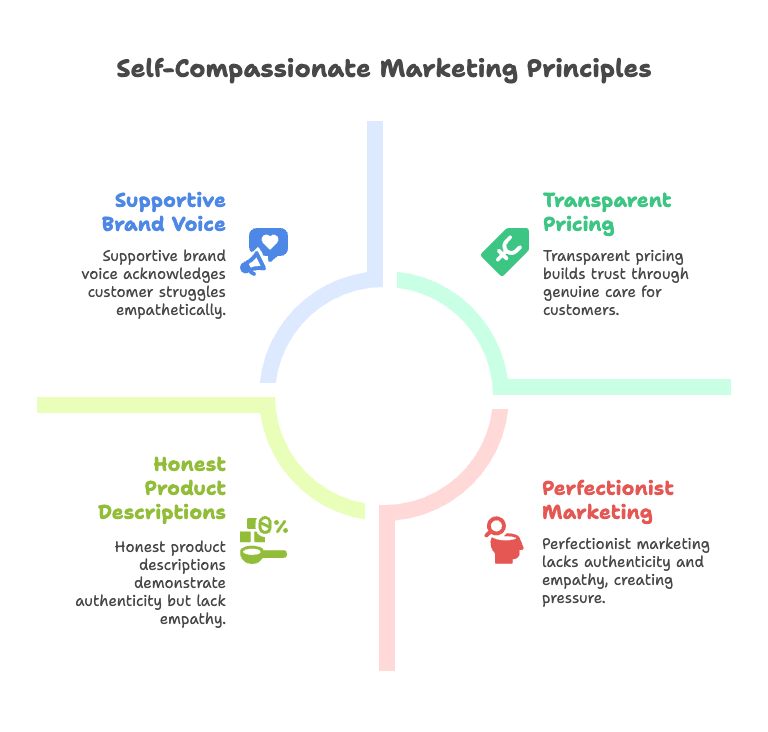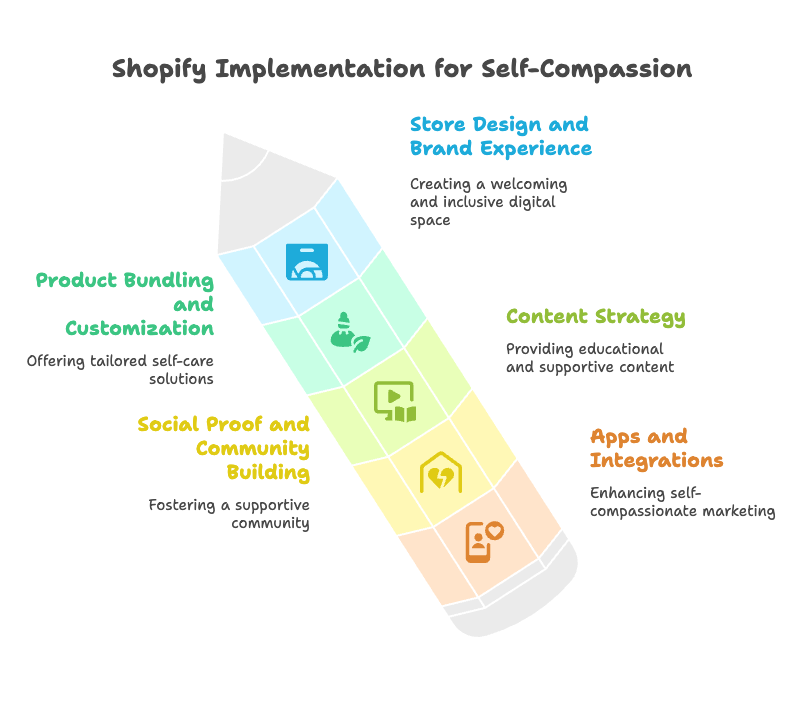Picture this: A potential customer lands on your self-care product page at 2 AM, feeling overwhelmed and searching for something—anything—to help them feel better. They’re not just buying skincare or aromatherapy candles. They’re investing in hope, comfort, and a kinder relationship with themselves.
Here’s where most e-commerce stores get it wrong. They hammer visitors with “Transform your life NOW!” or “Get perfect skin in 7 days!” But what if your marketing spoke to their inner critic with the same gentle voice they desperately need to hear?
Welcome to self-compassionate marketing—a revolutionary approach that’s transforming how successful Shopify stores connect with self-care consumers. This isn’t just another marketing trend. It’s a fundamental shift toward building genuine relationships with customers who are seeking more than products; they’re seeking understanding.
Defining Self-Compassion and Its Consumer Relevance
Self-compassion isn’t fluffy psychology—it’s powerful consumer behavior. At its core, self-compassion involves treating yourself with the same kindness you’d offer a good friend during difficult times. It combines three essential elements: self-kindness instead of harsh self-judgment, common humanity rather than isolation, and mindful awareness instead of over-identification with negative emotions.
Today’s self-care consumers aren’t just buying products. They’re investing in emotional wellness, seeking brands that understand their struggles without adding to their burdens. When someone purchases your stress-relief tea or mindfulness journal, they’re making a statement: “I deserve care, patience, and kindness—starting with how I treat myself.”
This shift matters because traditional marketing often triggers shame and inadequacy. But self-compassionate messaging? It creates safety, trust, and long-term loyalty.
The Strategic Opportunity for Shopify Stores
The emotional wellness market has exploded, with consumers increasingly prioritizing mental health and self-care. But here’s the opportunity most Shopify stores miss: while everyone’s jumping into the wellness space, few understand how to communicate with genuine empathy.
Self-care consumers have unique expectations. They can spot inauthentic wellness marketing from miles away. They want brands that acknowledge the messiness of real life, celebrate small progress, and never make them feel guilty for needing support.
The differentiation opportunity is massive. While competitors push perfectionist messaging and quick fixes, you can build a brand that offers something far more valuable: understanding, patience, and authentic care.
Principles of Self-Compassionate Marketing for Self-Care Products

Core Elements of Self-Compassion in Commerce
Emotional intelligence becomes your secret weapon when you understand how to apply it practically. Self-regulation means your brand voice remains consistently supportive, even when discussing challenging topics. Empathy shows up in how you acknowledge customer struggles without dismissing or minimizing them. Self-awareness helps you recognize when your messaging might inadvertently trigger shame or inadequacy.
Your communications should feel like a wise, patient friend offering support. Instead of “Fix your anxiety with our premium tea blend,” try “When life feels overwhelming, you deserve a moment of calm—and you deserve to take it without guilt.”
This approach fosters belonging. Customers don’t just buy from you; they feel seen and understood by you. They join a community that celebrates progress over perfection and kindness over criticism.
Kindness versus Perfectionism in Brand Voice
Perfectionist marketing sounds like: “Get flawless skin!” Self-compassionate marketing sounds like: “Your skin is on its own unique journey—let’s support it with gentle, consistent care.”
The difference? One creates pressure and inevitable disappointment. The other creates realistic expectations and sustainable habits. Your messaging should encourage gentle self-improvement, acknowledging that real change takes time and patience.
Language that reassures rather than pressures becomes your competitive advantage. Words like “nourish,” “support,” “gentle,” and “at your own pace” replace “transform,” “fix,” “instant,” and “dramatic.”
Building Trust Through Authenticity and Transparency
Honest product descriptions build the foundation of self-compassionate marketing. When you transparently share ingredients, sourcing practices, and realistic expectations, you demonstrate respect for your customers’ intelligence and autonomy.
Transparent pricing eliminates the anxiety that comes with hidden costs or manipulation. Ethical sourcing shows your values extend beyond profit to genuine care for people and planet.
Most importantly, your messaging should avoid guilt and FOMO tactics. Instead of “Don’t miss out—only 24 hours left!” try “Take your time deciding what feels right for your self-care journey.”
Highlighting Self-Compassion in Storytelling
Your brand origin story becomes powerful when rooted in genuine care and empathy. Share the real moments of struggle that led to creating your products—not just the polished success story, but the messy, human journey of wanting to help.
Customer testimonials should reflect authentic experiences of growth, including setbacks and small victories. Highlight stories that show progress isn’t linear and that self-care isn’t always Instagram-pretty.
Create content that addresses common self-care struggles with empathy rather than judgment. Acknowledge the guilt people feel about spending money on themselves, the difficulty of maintaining routines, and the patience required for real change.
Shopify Implementation: Turning Self-Compassion into Actionable Features

Store Design and Brand Experience
Your Shopify theme choice communicates volumes about your brand values. Select calming, inclusive themes that prioritize readability and accessibility. Soft color palettes, generous white space, and intuitive navigation create the digital equivalent of a warm, welcoming space.
Wellness-focused imagery should reflect real diversity—different body types, ages, ethnicities, and life circumstances. Avoid overly polished, perfect lifestyle photos in favor of authentic moments of self-care and genuine expressions of peace and contentment.
Accessibility isn’t just good practice—it’s an expression of your commitment to inclusion. Ensure your site works for customers with disabilities, those using screen readers, and people with different technological comfort levels.
Product Bundling and Customization
Self-care kits create opportunities for thoughtful curation rather than aggressive upselling. Design bundles around emotional needs: “The Overwhelmed Parent Kit,” “New Job Stress Support,” or “Seasonal Transition Bundle.” Each collection should feel like a caring friend assembled it specifically for that situation.
Themed bundles around stress relief, relaxation, or mindfulness allow customers to address specific needs without having to research and decide on individual products. This reduces decision fatigue while providing comprehensive support.
Personalization options transform transactions into meaningful experiences. Offer custom notes, gift packaging options, and variant choices that allow customers to create something uniquely suited to their needs or those of someone they care about.
Content Strategy within Shopify Ecosystem
Your built-in blog becomes a valuable resource center rather than just an SEO play. Create articles that genuinely help customers develop self-compassion practices, establish sustainable self-care routines, and use your products as tools for self-kindness rather than quick fixes.
Educational content should address the emotional and psychological aspects of self-care, not just the practical benefits of your products. Help customers understand why they deserve care, how to overcome guilt about spending time and money on themselves, and how to maintain routines when life gets chaotic.
Video and image galleries showcasing real customer journeys provide authentic social proof while modeling what self-compassionate self-care actually looks like in daily life.
Social Proof and Community Building
Customer reviews become powerful when they reflect authentic experiences rather than just product satisfaction. Encourage reviews that share emotional journeys, challenges overcome, and small victories celebrated.
Creating community spaces tied to your Shopify storefront—whether through forums, discussion boards, or social media groups—allows customers to support each other in their self-care journeys while strengthening their connection to your brand.
User-generated content campaigns can focus on acts of kindness customers show themselves or others, creating a positive feedback loop that reinforces your brand values while generating authentic content.
Apps and Integrations for Self-Compassionate Marketing
Loyalty and referral programs can reward acts of kindness rather than just purchases. Consider points for leaving encouraging reviews, sharing self-care tips, or referring friends to your supportive community.
Automated follow-ups should feel like check-ins from a caring friend rather than sales pitches. Send gentle reminders about self-care, gratitude messages, or affirming tips that provide value independent of additional purchases.
Feedback collection becomes an opportunity for growth-focused dialogue rather than defensive damage control. Frame requests for feedback as ways to better support your community’s wellness journey.
Marketing Strategies Rooted in Self-Compassion for Shopify
Email and Retention Marketing
Welcome sequences should introduce new subscribers to your self-compassion philosophy before pitching products. Share your brand story, explain your approach to wellness, and provide immediate value through tips or resources that require no purchase.
Automated flows can celebrate customer milestones—not just purchase anniversaries, but personal growth markers like consistently using products or taking time for self-care. These touchpoints strengthen emotional connection while encouraging continued engagement.
Re-engagement emails should approach lapsed customers with curiosity and care rather than desperation. “We hope you’re taking care of yourself” followed by resources and a gentle invitation back feels much different than “We miss you—here’s 30% off!”
Social Media and Influencer Partnerships
Collaborating with wellness influencers requires careful vetting to ensure alignment with self-compassion values. Seek partners who share authentic struggles, celebrate imperfect progress, and demonstrate genuine care for their followers’ wellbeing over their own engagement metrics.
Campaigns highlighting personal stories of growth and self-acceptance resonate more powerfully than before-and-after transformations. Focus on emotional journeys, mindset shifts, and sustainable habit changes rather than dramatic external transformations.
Video content on Reels, TikTok, and Stories should showcase “real-life” empathy moments—how to be kind to yourself on difficult days, gentle ways to restart abandoned routines, and authentic self-care that doesn’t require perfect lighting or extensive preparation.
Content Marketing and SEO
Blog posts addressing self-care routines and the importance of self-compassion provide genuine value while naturally incorporating your products as supportive tools rather than magical solutions.
Value-driven SEO targeting involves understanding the emotional needs behind wellness and mental health searches. Target keywords like “how to be kinder to myself,” “gentle self-care for busy people,” and “starting over with self-care” rather than just product-focused terms.
Creating downloadable affirmations, meditations, and other supportive tools positions your brand as a resource for emotional wellness beyond just product sales, building trust and demonstrating genuine care for your community’s wellbeing.
Acts of Kindness as Marketing Initiatives
Giving back through donations to mental health or wellness causes per sale demonstrates that your commitment to wellness extends beyond your customer base to broader community support.
Random acts of kindness—surprise gifts with purchase, handwritten thank-you notes, or unexpected upgrades—create positive emotions and memorable experiences that strengthen customer loyalty.
Encouraging customers to share their own self-kindness acts for store credit or features builds community while reinforcing your brand values through customer behavior.
Advanced Tactics: Personalization, Automation, and Analytics on Shopify
Personalization Tools for Emotional Resonance
Shopify Audiences allows you to segment emotionally-receptive buyers based on behavior patterns, purchase history, and engagement with your self-compassion content. These segments enable more targeted, relevant messaging that feels personally crafted.
Product recommendations can be tailored to individual self-care needs based on previous purchases, browsing behavior, and stated preferences. Someone who consistently buys stress-relief products might appreciate recommendations for sleep support or mindfulness tools.
Segmented messaging based on customer journey stages ensures your communications meet people where they are—whether they’re just discovering self-care, establishing routines, or maintaining long-term wellness practices.
Marketing Automation with Empathy
Automated triggers should provide self-care tips, positive affirmations, and post-purchase check-ins that feel genuinely caring rather than sales-focused. The goal is supporting customer wellbeing, with purchases being a natural result of that support.
Timing automations become crucial for avoiding overwhelm. Gentle frequencies, clear opt-out options, and respect for customer preferences demonstrate that you prioritize their comfort over your marketing reach.
A/B testing messaging for self-compassion resonance helps you understand which approaches truly connect with your audience while avoiding tactics that might inadvertently trigger shame or pressure.
Measuring Success Beyond Sales
Tracking repeat purchases, average order value, and customer retention rates provides insight into the long-term effectiveness of self-compassionate marketing in building sustainable customer relationships.
Sentiment analysis of reviews, feedback, and social mentions reveals how customers actually feel about your brand beyond just their purchasing behavior. Positive emotional connection often predicts long-term loyalty better than single-transaction metrics.
Surveys targeting perceived emotional connection and brand trust help you understand whether your self-compassionate approach is genuinely resonating or if adjustments are needed to better serve your community’s emotional needs.
Case Studies: Shopify Stores Excelling at Self-Compassionate Marketing
Real-World Store Examples and Their Tactics
Herbivore Botanicals exemplifies transparency through detailed ingredient explanations, calm visual design, and messaging that emphasizes gentle care rather than dramatic transformation. Their product descriptions read like supportive guidance rather than sales copy.
Drunk Elephant takes an educational approach, providing honest product details while maintaining a playful, self-accepting tone that acknowledges skincare confusion and encourages patience with the process rather than immediate perfection.
Blume addresses self-care struggles with remarkable empathy, providing detailed customer guidance that goes far beyond product usage to address emotional aspects of wellness and self-acceptance.
BUBS Naturals and Hiya demonstrate personalized retention through audience segmentation, creating tailored experiences for different wellness communities while maintaining consistent values of support and encouragement across all touchpoints.
Lessons Learned and Best Practices
Successful self-compassionate marketing requires alignment between marketing tone, store design, and customer journey to create cohesive emotional impact. Mixed messages undermine trust and confuse customers about your brand values.
Avoiding over-hype and guilt-driven marketing language requires constant vigilance and regular review of all customer touchpoints. What feels motivational to marketers often feels pressuring to consumers seeking genuine support.
Building loyal customer bases through kindness rather than pressure creates sustainable business growth based on genuine relationship rather than transactional interactions driven by discounts and urgency.
Practical Next Steps: Building a Self-Compassionate Shopify Store
Self-Assessment: Store and Brand Audit Checklist
Evaluate whether your brand voice consistently demonstrates empathy and inclusion across all touchpoints. Check product descriptions, email sequences, social media posts, and customer service interactions for alignment with self-compassion principles.
Assess whether your product and content offerings are grounded in genuine care for customer wellbeing rather than just profit optimization. Your customers can sense the difference, and authenticity becomes your competitive advantage.
Review your store design for accessibility, supportiveness, and calming qualities. Consider whether your visual presentation creates stress or peace, exclusion or inclusion, pressure or patience.
Actionable Roadmap for Store Owners
Identify specific opportunities for improvement in messaging, product presentation, and automation sequences. Start with the most customer-facing elements and work systematically through all touchpoints.
Experiment with self-compassion-driven campaigns on a small scale, measuring impact through both quantitative metrics and qualitative feedback. Look for changes in customer engagement, retention, and sentiment alongside traditional sales metrics.
Foster continuous feedback loops with your customer community to enhance emotional resonance and ensure your efforts genuinely serve their needs rather than just your business goals.
Long-Term Growth Through Values-Driven Commerce
Building customer loyalty through authentic relationships creates sustainable competitive advantage that discounting and feature wars cannot replicate. Customers who feel genuinely cared for become powerful advocates for your brand.
Positioning for future trends in wellness e-commerce means staying ahead of the curve on emotional intelligence, mental health awareness, and authentic brand communication. Self-compassionate marketing isn’t just current—it’s foundational for long-term success.
The investment in self-compassionate marketing pays dividends not just in customer metrics, but in the satisfaction of building a business that genuinely improves people’s lives while generating sustainable profit. This alignment between values and business success creates the foundation for lasting growth.
References
- Shopify. “Why Emotional Intelligence Is Important in Marketing.” (2023). https://www.shopify.com/hk-en/enterprise/blog/66328195-how-to-strengthen-your-marketing-using-emotional-intelligence
- Shopify. “10 Acts of Kindness to Win Customers’ Hearts in 2024.” (2023). https://www.shopify.com/za/blog/acts-of-kindness
- Shopify Community. “How Can Shopify Stores Celebrate Self-Love This Valentine’s Day?” (2025). https://community.shopify.com/c/shopify-discussions/how-can-shopify-stores-celebrate-self-love-this-valentine-s-day/m-p/2941650
- AutoDS. “Mental Health And Self-Care Products: Profitable Ideas For 2025.” (2025). https://www.autods.com/blog/dropshipping-niches/mental-health-self-care-products-dropshipping/
Ready to transform your Shopify store with perfectly optimized, empathetic marketing that truly resonates with your self-care customers? Growth Suite is a Shopify app designed to help you boost sales and revenue through intelligent discount code optimization and behavioral insights. Instead of bombarding every visitor with discounts, Growth Suite helps you identify the customers who truly need that extra incentive while preserving your brand’s premium positioning. Install it with a single click and start building more compassionate, profitable customer relationships today!




